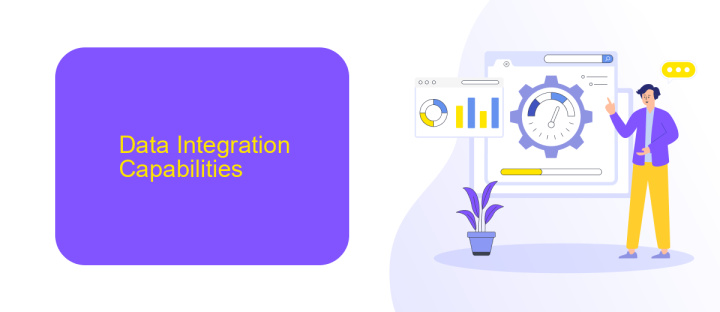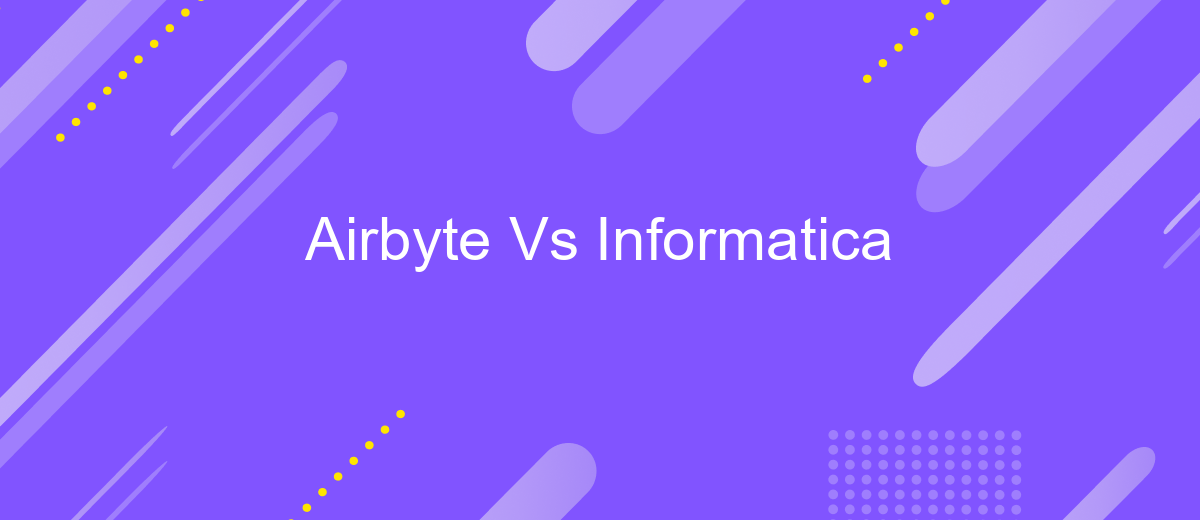Airbyte Vs Informatica
In the ever-evolving landscape of data integration, choosing the right tool is crucial for businesses aiming to streamline their data workflows. This article delves into a comparative analysis of Airbyte and Informatica, two prominent data integration platforms. By examining their features, capabilities, and user experiences, we aim to provide insights that will help you make an informed decision tailored to your organizational needs.
Introduction
In the rapidly evolving world of data integration, choosing the right tool can be a daunting task. Airbyte and Informatica are two prominent players in this field, each offering unique features and capabilities. This article aims to provide a comprehensive comparison to help you make an informed decision.
- Airbyte: Open-source, highly customizable, and community-driven.
- Informatica: Enterprise-grade, robust, and offers extensive support.
- ApiX-Drive: Simplifies integration processes with an easy-to-use interface.
Whether you are a startup looking for flexibility or an enterprise needing a reliable solution, understanding the strengths and weaknesses of these platforms is crucial. Additionally, services like ApiX-Drive can further streamline your integration efforts, making it easier to connect various data sources seamlessly. Read on to delve deeper into the features, performance, and use cases of Airbyte and Informatica.
Data Integration Capabilities

Airbyte and Informatica both offer robust data integration capabilities, but they cater to different needs and use cases. Airbyte is an open-source platform that excels in flexibility and customization, making it ideal for developers and data engineers who require a high degree of control over their data pipelines. It supports a wide range of data sources and destinations, and its modular architecture allows users to easily add new connectors or modify existing ones. This flexibility is further enhanced by the community-driven approach, where users can contribute and share their own connectors.
Informatica, on the other hand, is a more comprehensive and enterprise-grade solution. It offers a wide array of pre-built connectors and advanced features such as data quality management, data governance, and real-time data integration. Informatica's platform is designed for large-scale deployments and is well-suited for organizations that require robust security, compliance, and extensive support. Additionally, services like ApiX-Drive can complement both platforms by providing an easy-to-use interface for setting up integrations without extensive coding, thus bridging the gap between technical and non-technical users.
Platform Features and Services

When comparing Airbyte and Informatica, it's essential to consider the platform features and services each offers. Both platforms provide robust solutions for data integration, but their approaches and capabilities differ significantly.
- Data Integration: Airbyte focuses on open-source data integration with a wide range of connectors, while Informatica offers a comprehensive suite of data management tools.
- Customization: Airbyte allows for extensive customization through its open-source nature, whereas Informatica provides pre-built templates and workflows for faster deployment.
- Scalability: Informatica excels in enterprise-level scalability, supporting complex data environments, while Airbyte is designed for flexibility and ease of use, suitable for both startups and large organizations.
- Automation: Platforms like ApiX-Drive can be integrated with both Airbyte and Informatica to automate data workflows and enhance integration processes.
- Support and Community: Airbyte has a growing community and open-source support, whereas Informatica offers professional support and extensive documentation.
In summary, choosing between Airbyte and Informatica depends on your specific needs. Airbyte is ideal for those seeking flexibility and community-driven development, while Informatica is better suited for enterprises requiring robust, scalable, and professionally supported data integration solutions. Utilizing services like ApiX-Drive can further streamline and automate your integration processes, enhancing the overall efficiency of your data management strategy.
Pricing and Licensing

When comparing Airbyte and Informatica, pricing and licensing are crucial factors to consider. Airbyte offers a flexible, open-source model, making it free to use for most users. This can be particularly appealing for startups and small businesses looking to minimize costs while maintaining robust data integration capabilities.
Informatica, on the other hand, operates on a subscription-based pricing model with various tiers to accommodate different business needs. This can include additional costs for premium features, support, and scalability options. The total cost can be significant, especially for larger enterprises requiring extensive data integration solutions.
- Airbyte: Open-source, free for most users
- Informatica: Subscription-based, tiered pricing
- Additional costs for premium features and support (Informatica)
Both platforms offer comprehensive integration capabilities, but the choice between them often comes down to budget and specific business requirements. For those needing a cost-effective solution with flexibility, Airbyte is a strong contender. However, larger organizations may find Informatica's extensive features and support justifies the higher cost. Additionally, services like ApiX-Drive can help streamline the integration process for either platform, providing added value and ease of use.
Case Studies and Success Stories
One notable success story is from a leading e-commerce company that leveraged Airbyte to streamline their data integration processes. Faced with the challenge of consolidating data from multiple sources, the company chose Airbyte for its flexibility and open-source nature. By implementing Airbyte, they were able to efficiently aggregate data from various e-commerce platforms, CRM systems, and marketing tools. This not only improved their data accuracy but also enhanced their decision-making capabilities, leading to a 20% increase in sales within six months.
In contrast, a global financial institution opted for Informatica to handle their complex data integration needs. With a vast amount of sensitive financial data to manage, the institution required a robust and secure solution. Informatica's comprehensive suite of tools provided them with the necessary scalability and compliance features. Additionally, they integrated ApiX-Drive to automate their data workflows, ensuring seamless data transfer between different systems. As a result, they achieved a 30% reduction in operational costs and significantly improved their data governance practices.
FAQ
What are the key differences between Airbyte and Informatica?
Which platform is more suitable for small businesses?
How do Airbyte and Informatica handle data security?
Can I automate data integration processes with these platforms?
What support options are available for Airbyte and Informatica users?
Apix-Drive is a universal tool that will quickly streamline any workflow, freeing you from routine and possible financial losses. Try ApiX-Drive in action and see how useful it is for you personally. In the meantime, when you are setting up connections between systems, think about where you are investing your free time, because now you will have much more of it.

